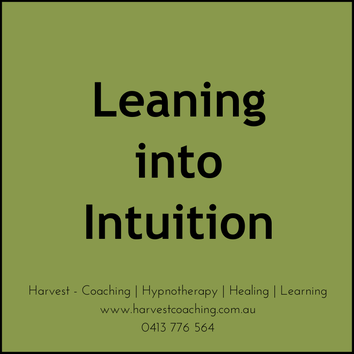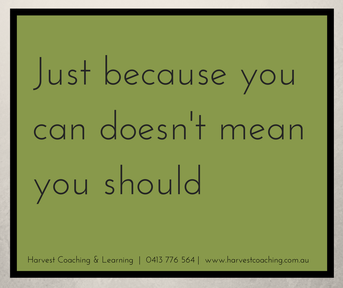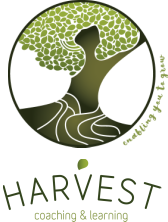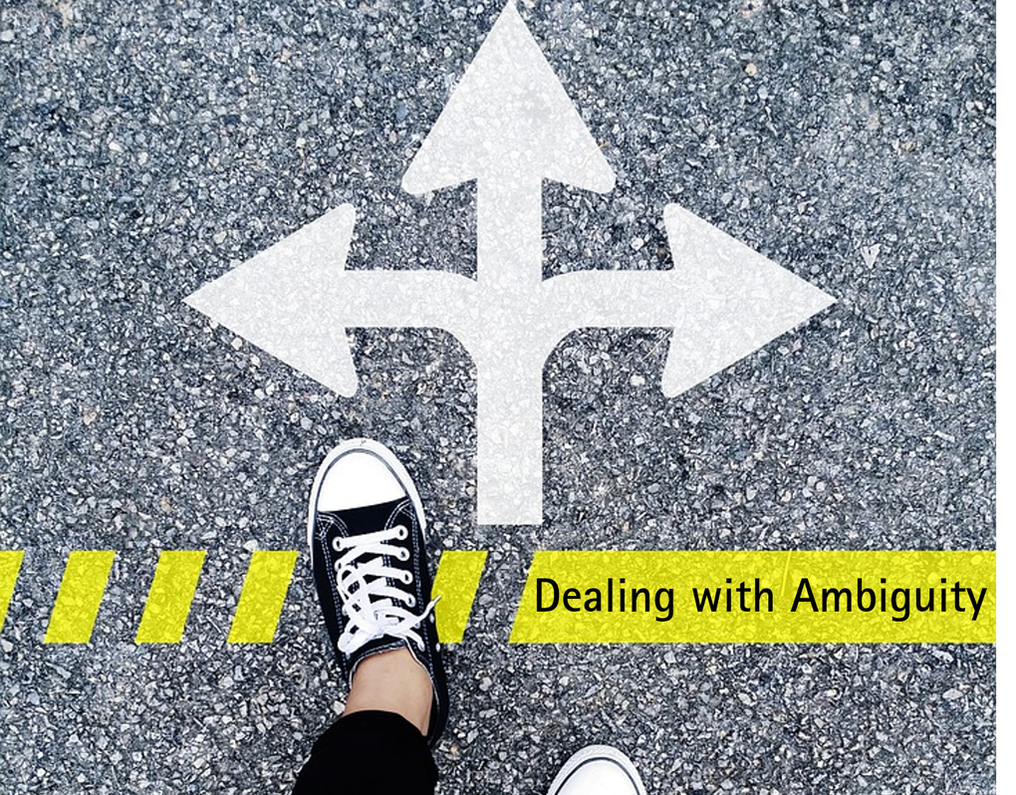Leaning into Intuition When you hear the expression ‘leaning into intuition,’ what does this mean for you? Take a moment if you like and simply reflect. What comes up? Where do you feel it in your body? What emotions are associated with it and what thoughts come to mind? How does your intuition present for you? It could be images, thoughts, words, a general knowing, or something else. What is Intuition? There are a number of definitions of intuition, but we can define it as the ability to understand, or to know something instinctively, without the need for conscious reasoning. Intuition vs Rational Thinking While I’ve always drawn on intuition, recently I’ve been increasingly leaning in. As a result, it’s like a muscle that’s strengthening, which is kind of exciting! In the past I would sometimes lean in, and other times lean away, doubting myself. What I realise though is that my intuition is strong and provides great insight, both for me and also for my clients. I also find it helpful to remember that it doesn’t have to be a situation of either/or. That is, it doesn’t have to be either logic and rational thinking, or intuition, but that it can be both/and, both logic, rational thinking, and intuition. It works well when you allow logic, rational thinking and intuition to complement each other, rather than one negating the other. When I reflect on my life, my best decisions, choices and insights have always had at least an element of intuition guiding them. The Benefits I find when I really lean into intuition, I connect with people at a deeper level and I have information, ideas, and ways forward accessible to me that I wouldn't otherwise have. This has supported my clients, it’s supported me, and it’s supported the ways we can work together. As a result, I find I consciously access my intuition more and more often. For me this is a combination of remaining open, noticing, and also of asking. When working with coaching and hypnotherapy clients, I may consciously (although silently) ask, what does this person need, or what would help this person, or what does the person need to know. And I often get answers that resonate for them. This isn’t a process of telling, but of simply sharing and allowing them to play with what comes through, as well as supporting them to access their own intuition. I’m curious, do you draw on intuition, and if so, what does this enable for you? If you enjoy working with someone utilising an intuitive approach, please do reach out. Likewise, please reach out to share your experience with leaning into intuition. Warmly, Laurenne Coach (PCC) | Clinical Hypnotherapist | Facilitator 0413 776564 www.harvestcoaching.com.au
0 Comments
Integrating 'Soul Based' into the Professional Space  Have you ever been interested in areas you feel don’t fit neatly into the professional world? Where if you talk to people about these areas, you might get a few odd looks? This has felt true for me. For clarity, when I say professional, I’m using this term in the context of the corporate or organisational space. In truth, I am now questioning whether my interests really don’t fit, or if this has been an assumption on my behalf. I think it may actually be the latter. Let me explain. I have always been very interested in holistic, or integrated approaches to personal and professional development and wellbeing. This includes spaces of energetic healing, soul, or spiritual approaches to development, what I jokingly refer to as the space of ‘woo’. Like many, I’m not religious, but I am very interested in spirituality, purpose, connection and belonging, actually all very well researched areas. To date, I have usually tried to keep more ‘soul based’, spiritual approaches out of work, or integrated them more subtly, not talking to them explicitly for fear of not being taken seriously. I talk about my university qualifications, my professional certifications, and my professional experience, but less about my exploration and interest in less ‘Western’ approaches. I value and I am guided in my work by evidence-based approaches. I have, and continue to study these approaches. I also appreciate approaches that aren’t as easily ‘evidenced,’ or evidenced by more traditional measures. I feel the ‘lived experience’ in these spaces does provide evidence for efficacy, but not always in the way approaches such as cognitive behavioural approaches, or positive psychology might. So back to my assumptions. At university, I loved tie dye, crystals, essential oils, energy-based healing and delving into ‘spiritual’ approaches (to be clear, many are very much evidence based and grounded). I still do, except I’m a bit less drawn to tie dye these days. However, as I moved into the professional world, I felt the need to keep this separate from my ‘professional persona’ for fear of being seen as unprofessional, as a bit ‘out there’ and for fear of not being taken seriously. And yet, increasingly my professional clients are also seeking meaning, belonging, connection and purpose, and this has opened up conversations, suggesting that even if the professional world may not be open to a bit of ‘woo’, the people working in the professional world definitely are, and are already exploring these spaces. They are just often doing this, like I was, without the overlap into their professional worlds. So why does this matter? Well, it means we may not be bringing all of ourselves to work. It means we might be missing opportunities for conversations and approaches that allow us to explore areas that can be integrated into supporting our search for meaning, connection, purpose and in guiding our self-awareness, development, and growth. I think this is important and I welcome opportunities to open up and normalise conversations in this space, conversations guided by curiosity and without judgement. I recently achieved certification as a ‘Soul realignment® Practitioner’, a modality based on accessing the Akashic records to understand who we are at soul level. I am about to embark on further studies in hypnotherapy (obviously very evidence based), energy healing (also evidence based) and spiritual healing. I am keen to formally study new areas, adding to those I am already familiar with. This will allow me to support the development of the mental, emotional, physical and spiritual aspects of the people I work with in new ways, adding to the toolkit I already reach into to support my clients in their personal and professional development and wellbeing. I’m keen to continue bringing this language and these approaches into discussions with people working in the professional world. I’m curious, what have your experiences been when incorporating ‘soul based/spiritual’ practices into professional discussions? Have you made any assumptions around what modalities for development are ok and not ok to talk about at work? I’m choosing to challenge my own assumptions in the space and welcome the discussion and exploration, as a I do the opportunity to more opening apply a very integrated approach into my practice. Warmly, Laurenne Executive, Leadership, Personal & Professional Development Coach (PCC), Facilitator and Consultant. 0413 776 564 www.harvestcoaching.com.au Let's Connect Laurenne Di Salvo offers services in coaching, facilitation, and holistic approaches to development, enabling individuals and groups to develop the personal and professional capabilities, self-awareness, skills and confidence they require to navigate their current and future roles, lives and wellbeing. Seen in the right light, getting a new manager is an opportunity to shake up the status quo and begin anew. But without care, manager transitions can be disorienting and even demotivating — especially if they happen often. Josh Bersin has said that becoming a people manager is the most difficult professional transition most people make. Sometimes, for team members, getting a new manager can feel equally difficult. Often, employees have even less support than managers do in understanding how to navigate the new relationship and make it positive and productive. So, whether you’re the new manager coming in or the team member getting a new manager, have a little empathy and patience with the other. Read on for insight into what’s going on and how best to respond. What's the worry? The prospect of getting a new manager can be both exciting and anxiety inducing. To some degree, it matters whether you find yourself reporting to a new manager because you have moved into a new role yourself versus having a new manager hired in above you. Many of the concerns, however, are surprisingly similar. The people I work with often have concerns about having to prove (or re-prove) their capability and value to a new person. This can be especially difficult for people who were experiencing success or were very comfortable in their role. They also worry about whether their new manager’s style will be compatible with theirs, and if things will change, be it programs of work, priorities, ways of working, or the culture of the team. If performance reviews and salary reviews are approaching, they may be concerned that their new manager won’t know them well enough to be fair in their appraisals. There can be a tendency to fall into all-or-nothing thinking when anticipating a change in management: we will or won’t be compatible (you’ll both adjust and find a way to work together). I’m afraid things will change (of course some will — that is the nature of work and life). In managing the emotional impact, it is critical to apply a growth mindset and to stay curious and open. This may involve noting down both concerns and sense checking whether your concerns are facts or assumptions. For assumptions, how can you check their validity? For facts, what is the opportunity? What is within your control to influence or impact? Sometimes when the manager is hired in above them, and the individual was hoping for the role themselves, they can feel overwhelmed with a sense of disappointment, injustice, and potentially anger to manage. The employee needs to process these feelings in order to develop an effective working relationship with the new manager. Strong unresolved and unacknowledged emotions will otherwise get in the way of the individual being able to learn and develop under the new manager, hurting their career and their team. How to make getting a new manager a catalyst for professional growth A new manager is a wonderful opportunity for learning and development, as well as connection and networking. Again, curiosity and openness are important. A new manager is a window into how things have been done in other teams or organisations and what might be useful in your team, too. Reflecting on what you do like about your new manager’s approach, and what knowledge and skills (both technical and people oriented) they bring will enable you to determine how they might support your development. Which of your strengths can they help you to develop further? How might they relate to your growth and aspirations? And where might they have some unique ability to mentor and coach you in areas you aren’t as strong yet? You may also be curious about your new manager’s background and how that led them to their current role, highlighting career pathways you may not have been aware of. Finally, they will have networks and connections that in time, may lead to growth opportunities for you too. So you have a new manager, now what? From a practical perspective, a person getting a new manager should focus on what they can control and make the most of the transition period. If you aren’t happy about getting a new manager, it can be a good time to practice letting go of frustration or preoccupation with what you cannot control. Not only will it help you feel better, it’s also an important skill to develop for professional success. Leaders generally look for what they can make of any situation. Think of getting a new manager as an opportunity to reset. Was there anything that wasn’t working previously that might be improved with the benefit of hindsight? A word of caution, a new manager isn’t a blank slate. They generally know something of the team, the roles and expected outcomes, but they also may be open to shaking it up. The transition period is relatively short. Your priorities are to: 1) establish a relationship, 2) understand their working style, 3) convey what is important to you. In establishing a relationship with a new manager, as far as possible, leave assumptions aside and approach your new manager with curiosity. If time hasn’t been set up for you, ideally block some time with your manager to get to know them. You might like to learn about their background, their vision for the team (if they know this – it may come later), their style and preferred ways to work. Do they like to develop ideas collaboratively or have individuals present more formulated plans? Are they casual, more formal, and how much does it depend on the situation? Are they detail-oriented or big-picture? Don’t forget to think through what you want to let them know about you. That doesn’t mean a chronological history: what do you want them to walk away knowing about you, your style, and what gets you excited about the job? Keep it simple. What are your strengths? What do you enjoy? How can you support them? What type of support would you like from them? What is your style and your preferred ways of working? Ideally, also think through what additional details you would share in order to let them know a little more about you as a whole person. If your manager asks you to tell them about yourself, what will you say? What’s important to you? Wishing you every success! Warmly, Laurenne Di Salvo Executive, Leadership & Professional Development Coach (PCC), Facilitator and Consultant. 0413 776 564 www.harvestcoaching.com.au Let's Connect Laurenne Di Salvo is a Coach (PCC), Corporate Trainer and Learning & Development Consultant. She enables people to develop the personal and professional capabilities they require for their current and future roles and lives through evidenced based coaching practices and learning programs. #leadership #transition #newleader #change #employeeengagement #opportunity #coach #mentor #mindset Originally published by BetterUp.
When one door closes, another opens, but it’s one hell of a corridor!
I heard this expression last year, yet I feel it’s come into its own in 2020. I honestly believe there are some amazing changes, mindset shifts, ways of working and ways of interacting and being that are already coming out of 2020 and all that the year has brought with it, but it really is one hell of a corridor! So, how do you navigate the corridor? That depends a lot on how you’re experiencing it. To throw around another cliché, we are in this together, but experiencing it differently, so your navigation will depend on your experience. Do you need to sit with the discomfort of uncertainty and ambiguity? I think for most, this will be their truth to some degree! Do you need to manage your boundaries so as not to burn out with an excessive workload? Or is it the opposite, and your work has been impacted and you are either working a lot less, or not at all? Are you managing a full household with competing priorities, or are you living alone and managing the isolation, or are you somewhere in between? Are you close to the new open door, or is it still a long way in the distance, or are you unsure? You might be living in lockdown (we are in Melbourne as I write this), or maybe you’re able to move around, visit friends and family and participate in everyday activities. All of these things will impact your corridor, as will any false doors along the way, if the corridor is straight, or if there are twists and turns. Regardless, another door will open and there is so much learning to be done along the way. A couple of things that may help you navigate this time are to remember that you don’t have to move along the corridor alone, and to be gentle with yourself. Try not to put unnecessary pressure on yourself during a time that so many things are beyond your control, rather focusing on things you can control and influence. See you in the corridor, with appropriate social distancing and a face mask 😊. Warmly, Laurenne Executive, Leadership & Professional Development Coach (PCC), Facilitator and Consultant. 0413 776 564 www.harvestcoaching.com.au Let's Connect Laurenne Di Salvo is a Coach (PCC), Corporate Trainer and Learning & Development Consultant. She enables people to develop the personal and professional capabilities they require for their current and future roles and lives through evidenced based coaching practices and learning programs.  We’re all grieving - Creating space for the fear, discomfort and grief of COVID-19 As you can imagine, my coaching sessions currently include a lot of discussion around COVID-19 and it’s impacts, both practical, and more importantly, the emotional impacts. We’re all grieving Something that really stands out is the fact that we’re all grieving. We’re grieving for many things. At the extreme, we’re grieving lives and the ability for some to say goodbye. For many though, it’s grieving for the loss of our freedoms, our short term personal and career goals, our jobs (be this complete job loss, partial reduction in our work flow, or our small businesses) and we’re grieving our ability to plan, to go on holiday and importantly, to visit and hug friends and family. For some this grief is strong, and for others it’s an underlying tension. Nothing is business as usual Nothing is business as usual. We’re in free fall and we don’t know for how long, and this is causing fear, uncertainty and grief. We need to give these feelings some space. This doesn’t mean we need to wallow, but many of us aren’t giving ourselves the space or permission we need to feel what we’re feeling at the moment. This isn’t to say we can’t still remain optimistic, make decisions and be strong leaders, team members, family members and role models, it just means we can do this AND make decisions, be strong leaders, team members, family members and role models. Give yourself and others permission to feel In fact, our vulnerability in recognising and allowing ourselves to admit both to ourselves and to others that we’re finding the current situation hard and uncertain and frustrating and challenging and that we’re feeling a little anxious, and grieving gives others permission to do the same. If you don’t allow space for your emotions, your grief, how do you lead others? How do you remain the best version of yourself? Acknowledging what’s going on for you can be a relief and free up the energy we need to then address this crisis with awareness, care and emotional intelligence so that we can be supportive of ourselves and others. The benefit of naming how you feel Some of my clients have highlighted that just naming how they’re feeling at the moment has been key for them, lifting a little of the weight they’re feeling and allowing them to then focus on their work commitments and crisis planning head on. This makes sense. When we give a name to our emotions, it helps shift our brain functions from the emotional center of our brains and into the prefrontal cortex, allowing us to move into rational thought and often de-intensifying the emotion. We're not negating the emotions, just reducing the intensity and creating a little space. A technique that can help is the BLR technique (Breathe Label Reappraise). This encourages us to take some deep breaths, calming us down, label the emotions we're feeling and to then reappraise the situation, be it actions, or reframing our mindset. I would just recommend you give yourself a little time before you move into reappraise. I sometimes have a tendency to try and speed this step up, yet there is value in really sitting with the emotions for a while. A few questions So I leave you with a couple of questions. How are you feeling? How can you honour your challenging feelings AND your positive emotions at the same time? How do you give yourself permission to feel the full spectrum of emotions elicited by our challenging times? Please stay well and look after each other. Warmly, Laurenne Executive, Leadership & Professional Development Coach (PCC), Facilitator and Consultant. 0413 776 564 www.harvestcoaching.com.au Let's Connect Laurenne Di Salvo is Coach (PCC), Corporate Trainer and Learning & Development Consultant. She enables people to develop the personal and professional capabilities they require for their current and future roles and lives through evidenced based coaching practices and learning programs. #coaching #covid19 #grief #bothand #emotions #resilience #uncertainty #ambiguity #change #grieving #carona #caronvirus #bettertogether  Are you ‘Pot Bound’? What’s the impact on your potential? We have a very tall eucalyptus tree in our front yard. It must be well over 10 metres tall. We’ve watched this tree grow over the past 10 or so years from a sapling that was given to me by a friend who used to have it in a pot in her backyard. She didn’t have the space to plant it in the ground and it was very pot bound. She knew it would never reach its potential in the pot and so she asked me to plant it in the ground. It is now definitely in a place it can reach its potential. Are you pot bound? I wonder how many of us allow ourselves to stay pot bound? In an organisational context, are we in jobs that we’re good at, but that no longer stretch us? Are we allowed to spread both our roots and our branches? If not, what’s our pot made of? Is it organisational constraints, a lack of encouragement and support, have you developed your capability in your current role to an extent that others don’t want to lose you from that role (i.e. the plant looks great where it is, and they want to keep it there, even if it’s not best for the plant)? Could it be your own confidence, mindset and belief systems, or something else? How do you know when you’ve moved beyond your comfort zone and actually become pot bound? And what impact is this having on your potential? Are you manifesting your potential? John Whitmore, in ‘What is Performance?’ (Coaching for Performance, 2002) suggests that on average, we only manifest about 40% of our potential in the workplace. Does this mean we aren’t able to even fill our pots, or are we actually pot bound? I would suggest that often we’re probably pot bound, either by our own beliefs or by organisational structures, processes and lack of support. Perhaps we just need nutrients and more sunlight, or perhaps we actually need to increase the size of our pot, or even be planted in the ground. If this is the case, how do know we’ve reached this point? How do I know it’s time to replant? I think the first sign is that of being aware of wanting to move out of your comfort zone. You may have a sense that you’re capable of more, even if you do enjoy your current role. You may feel bored, or unchallenged, you may have a sense of your increased capability and confidence, or you may feel that you are no longer a good fit with the company or team you’re working in. Finally, you may just feel restricted by the status quo. Moving to a bigger pot If this is the case, it may be time to look for a bigger pot. First become aware of what your pot is made of and then have a look at what a better fit would look like. What would allow you room to grow both your roots and branches? If you’re not sure how, consider coaching. This is a great way to tap into your potential and to explore a pot or patch of land that will allow you to reach your potential. Leadership & Professional Development Coach | Corporate Trainer | Learning & Development Consultant 0413 776 564 www.harvestcoaching.com.au Let's Connect Laurenne Di Salvo is an Accredited Coach (ICF), Corporate Trainer and Learning & Development Consultant. She enables individuals and groups to take the next step in their development through evidenced based coaching practices and learning programs. #potbound #potential #coaching #development #learning #challenge #strengths #comfortzone #discomfortzone #growthmindset #courage  Have you ever found yourself doing things that you are competent at, but that you don’t particularly enjoy? While you may not actively dislike the tasks, they certainly don’t energise you and perhaps they even leave you feeling bored. Maybe you’ve thought about moving into a new area of work because you already have the skills. It feels like the practical, sensible choice, but your heart’s just not in it. I sometimes explore these situations with clients with the thought starter “just because you can, doesn’t mean you should.” This can apply at work, in making career decisions and in your personal life. The nett result of ignoring ‘just because you can, doesn’t mean you should’ is that you often feel frustrated, dissatisfied or even bored. Why is this a problem? If you spend a lot of time doing things just because you can, there’s no time and space to do the thing things that you really enjoy, the things that keep you in flow, that light you up and energise you. You may experience the satisfaction of a job well done, but this is different from the satisfaction you feel when doing something you believe really represents you properly, that you feel proud to have completed well. A different approach What if you took a different approach and tapped into those things you really enjoy, rather than those things that you believe you ‘should’ do. One way to do this is to identify and draw on your ‘signature strengths’ rather than on your ‘learned strengths’. To identify your signature strengths, think about what gets you into flow. You know, that state where you get completely absorbed in a task and lose track of time. You often know you’re using your signature strengths when you feel energised, engaged and motivated. Ask yourself, does this idea/work/activity energise me? Do you feel ‘in flow’ when doing it or thinking about it? If not, you may be using a ‘learned strength’. This is one you’ve developed based on need, rather than one that comes naturally to you. If I was to give you an example, I can absolutely do detail oriented work. I can even do it quite well if I put my mind to it. However, I don’t enjoy it and I feel quite drained of energy when I spend too much time on these tasks. This doesn’t mean I should never do work of this nature. In fact, it’s really important that I can do this, as we all need to do detail oriented work at times. However, for me, I would be ill advised to work in a role where close attention to detail and routine were key aspects of the job, as this doesn’t draw on my signature strengths and it’s not what I enjoy. That is, just because I can, doesn’t mean I should. What's the benefit? Why does this even matter? Well, the research suggests that when we draw on our signature strengths we're happier and more productive. This has certainly been true for me. So, if you’re looking to move into a new role, think about what would best allow you to use your signature strengths. If you intend to stay put, think about how you could recraft your role a little to allow greater use of your strengths. What projects could you get involved in? How could you do your existing role a little differently? I wonder, how often are you in a ‘just because I can, doesn’t mean I should’ situation? What will you do differently? How can I learn about my signature strengths and how to apply them? Not sure what your signature strengths are or how to apply them? You can start by doing the VIA Character Strengths Survey, or the Gallup Strengths Survey. Not sure how to apply your strengths at work to allow you to do the best job you can? Not sure what you would like to be doing? Let’s connect and we can work through this together. Warmest wishes, Laurenne Di Salvo Leadership & Professional Development Coach | Corporate Trainer | Learning & Development Consultant 0413 776 564 www.harvestcoaching.com.au Let's Connect Laurenne Di Salvo is a Development Coach, Corporate Trainer and Learning & Development Consultant. She enables individuals and groups to take the next step in their personal and professional development through evidenced based coaching practices and learning programs. #strenghts #energy #flow #signaturestrengths #viacharacterstengths #gallupstrengths Dealing with ambiguity is a competency that often comes up in the workplace and is something my clients often talk to me about, both in a personal and professional context.
What is ambiguity and why is it desirable? Dealing with ambiguity is about coping effectively with change, it’s about being able to make decisions and to act on them without necessarily having a complete picture, without full information. It’s about being able to sit comfortably with a level of risk and uncertainty. Unsurprisingly, this makes many people decidedly uncomfortable. While some of us are better at ambiguity than others, the good news is that dealing with ambiguity is something we can develop. Why do we need to, you ask? Well, as I’m sure you know, the environment we work in is changing rapidly. Many of us have been exposed to at least one, and often many company restructures. Technology is impacting the way we work, with many people working off site, or without a fixed desk and the pace of change often means decisions need to be made quite quickly. What could ambiguity look like? Ambiguity shows up in many common situations that start well before you enter the workplace. A few of my own examples would be choosing a university course at high school with little life experience; travelling overseas on a one-way ticket with limited dollars, knowing I would get work, but not being sure what, how, or even in which country; living in share households; starting a romantic relationship. All these situations relied on an element of trust that things would be ok, as I didn’t have full information in any of these situations. Instead, I learned to make decisions and to problem solve based on the information I had at the time. Your own similar experiences will have provided fantastic experience and learning that can be applied in a professional context where you may experience one or more of the following:
The impact of ambiguity The thing about ambiguity is that it embodies uncertainty and as such, can result in feelings of overwhelm, stress, fear and can prevent us from moving forward or from implementing the actions we need to take. Managing ambiguity Your ability to manage ambiguity is linked to how much you trust yourself to cope with change and to problem solve on the spot if things don’t go according to plan. There are a number of things you can do to build your ambiguity muscle:
Finally, remember that managing ambiguity is not something that you either can or can’t do. It’s something you learn and the best way to learn something new is to practice, so pick situations that are less important for you and have a go at acting on the information you have right now. If you need some support developing your ability to manage ambiguity, give me a call on 0413 776 564 or learn more at www.harvestcoaching.com.au. Until next time (whatever that looks like), take care. Warmest wishes, Laurenne Di Salvo Leadership & Professional Development Coach | Corporate Trainer | Learning & Development Consultant 0413 776 564 www.harvestcoaching.com.au Let's Connect Laurenne Di Salvo is an Accredited Coach (ICF), Corporate Trainer and Learning & Development Consultant. She enables individuals and groups to take the next step in their development through evidenced based coaching practices and learning programs. #ambiguity #change #coaching #growthmindset #learning #development #stressmanagement #courage #personaldevelopment #professionaldevelopment Jump in the deep end, or climb down the ladder? Moving out of your comfort zone.
Do you have a preferred approach to moving out of your comfort zone? We’re often told to ‘just jump’, but we’re not all ‘jumpers’. Some of us prefer to test the waters first. To use a swimming pool metaphor, I find some people like to jump directly into the deep end, whilst others prefer to climb down the ladder one rung at a time. Both approaches are valid and both approaches work if they are the right one for you. When we sometimes run into trouble is when we’re encouraged to jump, but our preference is actually to climb down the ladder. To put this into context, jumping could look like quitting your job and moving into a new area of study or a new industry. Climbing down the ladder could look like continuing in your current role while completing new studies, or volunteering in another industry to see if you like it before resigning from your current role. There are also options in between. For instance, you may choose not to step on every rung of the ladder, but if you aren’t comfortable with jumping, then don’t. Rather, consider whether you need to step on all the rungs, or if you could perhaps miss a couple. This might look like cutting back to part time work while you study, or it could mean you make a decision with a little less information than you usually would, or it could be that you look for a similar role, but in an industry you would like to move into, rather than looking for a new role in a new industry. The key is to understand how you like to make change. This includes knowing what level risk you are comfortable with, what level of risk your current life circumstances suggest is realistic for you, what quantity of information and research you need to make decisions and what support network you have around you. Sometimes jumping in the deep end is absolutely appropriate and sometimes it’s not. If it’s not, take the time and space to explore information, ideas and options until you are ready to push away from the ladder, and if it takes a little longer than it would for a ‘jumper’, that’s ok. Likewise, if for you it’s time to jump, enjoy the leap. Most importantly, honour your preferences and what’s important to you. If you would like a sounding board and some support to determine which option could work best for you, give me a call on 0413 776 564. Warmest wishes, Laurenne Di Salvo Leadership & Professional Development Coach | Corporate Trainer | Learning & Development Consultant 0413 776 564 www.harvestcoaching.com.au Let's Connect Laurenne Di Salvo is a Development Coach, Corporate Trainer and Learning & Development Professional. She enables individuals and groups to take the next step in their personal or professional development through evidenced based coaching practices and learning programs. We all have blind spots. You know, those things others seem to know about us that we can’t see for ourselves, or perhaps it’s something we’re aware of in general, but we miss in specific instances, or we may be aware of our behaviour, but miss the impact it has on others. Whichever way, if we’re not aware of these behaviours or needs, they can trip us up and impact our interactions with others.
As always, the first step in doing something about a blind spot is awareness. And yet, having light shone onto a blind spot can be very challenging. It can have us questioning ourselves and our way of being and it can impact our confidence. It can absolutely feel like criticism, but it’s usually not. Really, it’s an opportunity for growth and personal development and as such, it's a gift. So how do we lessen the sting and increase the learning? I think there are a number of key steps: 1. Approach any feedback around blind spots with a learning mindset. Be curious. What does the behaviour, approach or mindset look like in different contexts? That is, how does the behaviour show up for us? For example, while I’m not proud of it, I know it doesn’t bring out the best in me if I don’t feel heard. This may show up in responses that are a little sharper than I intended, or I may interrupt instead of allowing someone to finish what they’re saying. The trick for me is to look further and see if needing to be heard actually shows up in other places that I’m a little less aware of. I need to be attuned to the signs that may be more subtle, but may still impact my interactions with others. This may be needing to finish a story, or being upset when someone interrupts me. Then I need to understand the impact this has on those I’m interacting with. 2. Create Space Viktor Frankl says that “between stimulus and response there is a space. In that space is our power to choose our response. In our response lies our growth and our freedom.” I think the next step in addressing blind spots is to create space. Once we are aware of a trigger, or of situations where we tend to slip into default behaviour that isn’t helpful for us (this could be holding back from saying what we need to say, it could be blaming others rather than being accountable, it could be repetitive patterns of behaviour with family members or colleagues), we then need to create the space to allow us to be more proactive in our responses. We can do this by breathing, we can do this by being curious about and observing our reactions, we can do this by acknowledging the emotion we’re feeling and then reappraising the situation and our response options. These are just a few of many options to create space. 3. Explore New Responses This is where we get to play with new responses. Now that we know what we’re doing and we know the response we will get with our default behaviour or mindset, we can use the space we’ve created to think about some alternative options. We can give them a try and see what the result is. How does the situation change? How do we feel using this alternative approach? Is it more helpful for us? Is it better received by others? Does it help us achieve our goals more effectively? If yes, keep doing this. If not, try another approach. This is a great chance to explore, to experiment and importantly, to learn. 4. Practice Self-Compassion Practising self-compassion isn’t actually a final step. It’s really something to implement the whole way through. Remember that no one is perfect. No one gets it right all the time and no one expects us to. And while some situations may not bring out the best in us, in most situations we probably behave very well and we probably do get it right. However, we are human and as such, we are fallible. What defines us is how we view our imperfections. This is where we circle back to implementing a learning mindset and the best way to do this is with curiosity and without judgement. So, notice what happened and if it happens again, use this as an opportunity to identify your triggers and to play with new ways of responding. Will it always be comfortable? Probably not. Will it enable growth, learning and personal development? Absolutely, if you let it. Warmest wishes, Laurenne Di Salvo Leadership & Professional Development Coach | Corporate Trainer | Learning & Development Consultant 0413 776 564 www.harvestcoaching.com.au Let's Connect Laurenne Di Salvo is a Development Coach, Corporate Trainer and Workshop Facilitator. She enables individuals and groups to take the next step in their personal or professional development through evidenced based coaching practices and learning programs. |
AuthorLaurenne Di Salvo Archives
March 2024

|
Contact+61 413 776 564
Harvest Coaching & Learning Pty Ltd operates both nationally and globally and is based in Melbourne, Australia. |
ConnectPlease leave us a Google Review
|








 RSS Feed
RSS Feed
